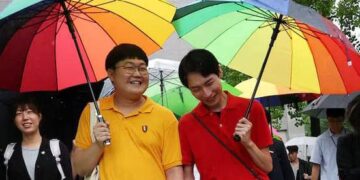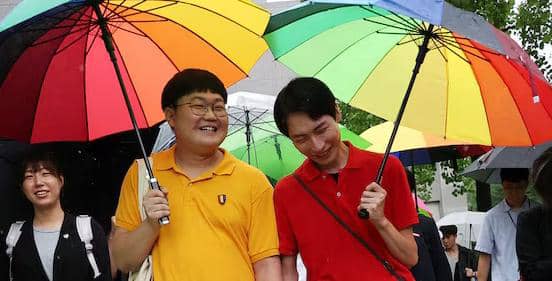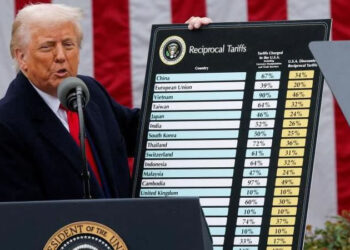By Lucy Adautin
South Korea’s Supreme Court on Thursday upheld a landmark ruling that a same-sex partner is eligible for spousal benefits from state health insurance, marking a significant win for LGBTQ rights in a region where progress has been slow.
The court affirmed an earlier decision by the Seoul High Court, which ruled that the National Health Insurance Service must provide equal spousal coverage to So Sung-wook and Kim Yong-min, a gay couple who sued the agency in 2021 after their benefits were canceled.
“I couldn’t believe it when I heard the ruling. I was extremely happy and started crying. It took four years to earn this dependent status. We need to fight harder to legalize same-sex marriage moving forward,” Kim said.
Chief Justice Jo Hee-de stated that denying benefits to the couple, despite the absence of specific clauses in the national health insurance act regarding same-sex unions, constituted discrimination based on sexual orientation.
“It is an act of discrimination that violates human dignity and value, the right to pursue happiness, freedom of privacy, and the right to equality before the law. The degree of violation is serious,” Judge Jo said during a televised trial.
So and Kim consider themselves a married couple, although their marriage is not legally recognized in South Korea. Lawyers and advocates noted that this ruling marks the first legal recognition of same-sex unions in the country.
“With this ruling today, the legal status of same-sex couples will be recognized in the public system. The existence of same-sex couples will become more visible,” said Chang Suh-yeon, one of the couple’s lawyers.
While same-sex marriage has been legalized in Taiwan and Thailand, South Korea still does not legally acknowledge LGBTQ partnerships, forcing couples to marry abroad if they seek legal recognition.
The Supreme Court’s ruling is a “stepping stone for progress” towards marriage equality, said Horim Yi, an activist with the LGBTQ campaign group Marriage For All. “It’s going to be a very hopeful ruling for same-sex couples living in South Korea,” Yi said.
Last year, the couple said they were sharing their story to help “change people’s opinions and encourage other LGBTQ people like us to gather courage.”
Conservative religious groups in South Korea have strongly opposed efforts to pass laws promoting LGBTQ rights, leading many to hide their identities in the workplace while struggling for equal recognition and acceptance.
Before the ruling, members of conservative Christian groups rallied outside the court, holding banners that read, “Same-sex families are nonsense. Supreme Court, overturn the Seoul High Court’s ruling”.




































